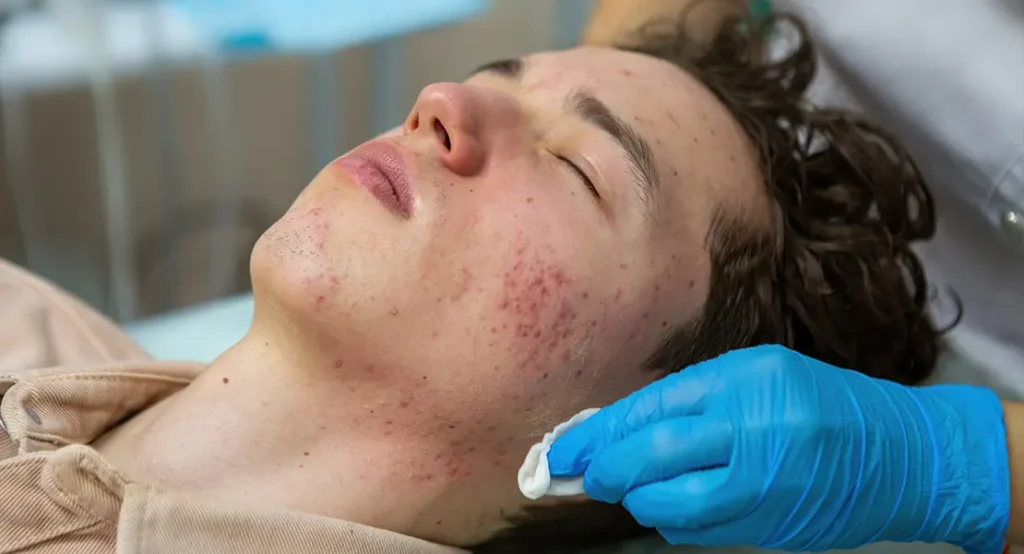If you’re the parent of a teenager or a teenager yourself, you’ve probably noticed just how common acne is today. It’s no longer just an awkward rite of passage that fades with age. These days, breakouts are appearing earlier, persisting for longer, and having a much more significant impact on teens’ confidence and emotional wellbeing. Across the UK, dermatologists are reporting a clear rise in adolescent acne cases, prompting concern among families and healthcare providers alike.
So, what’s really going on behind this spike? Is it just a matter of changing hormones, or is there something more at play? As it turns out, a mix of environmental, dietary, psychological, and even technological factors could be contributing to the problem. From increased screen time and stress levels to changes in diet and skincare habits influenced by social media, the landscape of teen skin health is shifting.
In this article, we’ll dive deeper into what’s driving the current acne surge among UK teens, unpack the latest national statistics, and explore how we at The London Dermatology Centre offer expert, tailored care that not only treats the skin but supports the whole individual. Whether you’re searching for practical solutions or simply hoping to understand the issue better, this guide will give you a clearer picture of the modern acne epidemic and what can be done to combat it.
What the Numbers Are Telling Us
Recent data from the NHS and leading dermatology organisations paints a concerning picture: acne is now affecting an estimated 85% of teenagers in the UK at some point during their adolescent years. That’s a noticeable rise compared to previous generations, when breakouts were often considered a short-lived issue that faded with age. Today, acne is not only more widespread it’s also becoming more persistent and severe.
What’s especially worrying is that this isn’t limited to the occasional spot or mild flare-up. Moderate to severe acne is being reported with increasing frequency, and many teenagers are continuing to struggle with it well into their late teens, early twenties, and in some cases even beyond. This prolonged skin condition can have a lasting impact not just on appearance, but on self-esteem, mental health, and social confidence.
Dermatologists across the country are seeing a sharp rise in the number of young patients seeking help. NHS dermatology services are feeling the pressure, with appointment backlogs and longer waiting lists now common in many regions. In parallel, private dermatology clinics are also seeing a noticeable increase in demand, as families look for faster, more personalised treatment options that go beyond over-the-counter products.
This growing trend highlights the urgent need for better awareness, earlier intervention, and access to professional support. Acne may be common, but it should never be dismissed as something teenagers simply have to “grow out of.” The numbers clearly show that we’re facing a modern skin health crisis one that requires both medical attention and empathetic, individualised care.
What’s Causing the Rise?
There isn’t a single, clear-cut reason behind the noticeable rise in teen acne across the UK. Instead, it’s the result of a complex mix of modern lifestyle, environmental influences, and biological factors. These elements are interacting in ways that leave teenage skin more vulnerable than ever. Let’s take a closer look at what’s really fuelling this surge:
- Stress and Mental Health Pressures:
Teenagers today face an unprecedented level of psychological pressure. From relentless academic demands and looming exam stress to social anxiety and the constant comparison culture fuelled by social media, stress levels among young people are higher than ever. And this isn’t just an emotional burden stress has a very real impact on skin. Elevated cortisol (the stress hormone) can increase oil production, trigger inflammation, and worsen existing acne, often creating a frustrating cycle of breakouts and low self-esteem. - Diet and Lifestyle Habits:
The modern teenage diet has changed significantly over the past couple of decades. With the easy availability of high-sugar snacks, processed foods, fizzy drinks, and dairy-heavy meals, many teens are consuming foods that may exacerbate acne. These types of diets can spike insulin levels, which in turn stimulates excess oil (sebum) production and inflammation in the skin two key drivers of acne. Frequent snacking, late-night eating, and poor hydration can all contribute to poor skin health as well. - Skincare Overload and Misinformation:
With platforms like TikTok, YouTube, and Instagram filled with skincare influencers and product recommendations, teens are constantly exposed to beauty advice some helpful, but much of it unverified or unsuitable. As a result, many adolescents end up using harsh exfoliants, layering incompatible ingredients, or washing their faces too frequently, all of which can damage the skin’s natural barrier. Ironically, in trying to fix their acne, many end up worsening it. - Environmental and Urban Pollution:
For teenagers growing up in densely populated urban areas, environmental pollution has become another invisible enemy of skin health. Polluted air carries particulates and toxins that can clog pores, increase oxidative stress, and promote inflammation all of which make acne harder to manage. Poor air quality, combined with a lack of green space or exposure to fresh air, can make urban skin more reactive and sensitive over time. - Hormonal Changes and Imbalances:
While puberty continues to be the primary trigger for acne, hormonal changes are becoming more complex. Conditions such as polycystic ovary syndrome (PCOS), which affects hormone levels and increases androgen production, are now being diagnosed more frequently among teenage girls. These imbalances can lead to more persistent and stubborn forms of acne, particularly around the jawline and cheeks. In many cases, hormonal acne requires medical support beyond typical skincare routines.
Why Acne Isn’t “Just Cosmetic”

Acne is often dismissed as a superficial concern something all teenagers go through that will eventually clear up on its own. But for many young people, acne is far more than just a few spots on the skin. It can have serious emotional and psychological consequences, affecting every aspect of daily life. When it comes to teenage acne, we must stop thinking of it as purely cosmetic. The reality is untreated, or poorly managed acne can leave behind emotional scars just as lasting as physical ones.
Here’s why acne deserves to be taken seriously:
- Impact on Self-Esteem
Adolescence is a time when self-image and confidence are still developing. When acne appears especially in visible areas like the face it can lead to feelings of embarrassment, shame, or self-consciousness. Teens may avoid mirrors, photos, or situations where they feel “on display.” Over time, this can seriously erode self-esteem, making it difficult for them to feel comfortable in their own skin. - Mental Health Concerns
Research has shown that teens with moderate to severe acne are at a higher risk of developing mental health issues such as anxiety and depression. Constant worry about appearance, fear of judgment, and isolation from peers can trigger emotional distress. In some cases, this emotional burden can become severe, leading to a loss of interest in activities, withdrawal from social life, or even suicidal thoughts if left unaddressed. - Social Withdrawal and Peer Pressure
In today’s world of selfies, video calls, and social media, the pressure to look “perfect” is more intense than ever. Teens with acne may avoid group activities, skip school events, or decline to participate in things they once enjoyed. They might fear being teased, left out, or compared to peers with clearer skin. This withdrawal can impact their social development and create feelings of loneliness or rejection. - Academic and Extracurricular Performance
You might not immediately link acne to academic performance, but the effects can be indirect yet powerful. Teens distracted by acne-related stress may find it harder to concentrate in class or speak up during presentations. Those avoiding social interaction might also skip sports, drama, or other extracurricular activities limiting opportunities to grow confidence and skills outside the classroom. - Long-Term Psychological Effects
If not addressed early, the emotional toll of acne can linger well into adulthood. Adults who experienced untreated or poorly managed acne as teens often report body image issues or ongoing insecurities about their appearance. Even after the acne clears, the emotional impact can persist, especially if scarring remains or if treatment was delayed.
How We Treat Teen Acne at The London Dermatology Centre
At The London Dermatology Centre, we recognise that no two teenagers and no two breakouts are the same. Acne is a complex condition that can be influenced by everything from hormones and genetics to diet, lifestyle, and mental health. That’s why we don’t believe in quick fixes or generic approaches. Instead, we take the time to truly understand your skin, your story, and your goals, creating a plan that’s as individual as you are.
Whether you’re experiencing your first breakout or have been struggling with acne for years, our expert team is here to support you with advanced medical insight, a warm and approachable manner, and results-focused care.
Here’s what a typical journey with us looks like:
Step 1: Comprehensive Consultation
Your treatment journey begins with a thorough, face-to-face consultation with one of our dermatology specialists. We don’t just glance at your skin and prescribe a cream we take a deep dive into your overall health, lifestyle, and skincare habits.
During this session, we assess:
- The type and severity of your acne (blackheads, whiteheads, cysts, nodules, etc.)
- Skin type and sensitivity
- Hormonal health and any family history of acne
- Current skincare routines and products
- Diet, sleep, stress levels, and other lifestyle influences
- Previous treatments or medications you’ve tried
This holistic view helps us understand the full picture not just the surface symptoms.
Step 2: Tailored Treatment Plan
Once we’ve gathered all the relevant information, we build a personalised treatment plan designed to target your acne safely and effectively. We carefully consider both short-term results and long-term skin health.
Depending on your individual needs, your treatment may include:
- Topical treatments: Prescription creams or gels containing active ingredients like retinoids, benzoyl peroxide, salicylic acid, or antibiotics to reduce inflammation and bacteria.
- Oral medications: For moderate to severe acne, we may recommend oral antibiotics, hormonal treatments such as the contraceptive pill, or isotretinoin in selected cases.
- In-clinic procedures: These may include light-based therapies (such as LED blue light to kill bacteria), chemical peels for exfoliation and scar prevention, or comedone extraction for blocked pores.
- Hormonal evaluation and therapy: For cases where acne is linked to hormonal imbalance (e.g., PCOS), we collaborate with endocrinologists or offer hormonal treatment options.
We always ensure that any medications or procedures are discussed in full and tailored to what you’re comfortable with.
Step 3: Ongoing Support and Review
Acne treatment is not a one-and-done process. Skin takes time to heal and respond, and adjustments are often necessary along the way. That’s why we provide ongoing care and scheduled review appointments.
At each follow-up, we:
- Monitor your skin’s progress and response to treatment
- Make adjustments to dosages, products, or routines as needed
- Address any new concerns, side effects, or lifestyle changes
- Provide encouragement and guidance to help you stay on track
This consistent support helps minimise the risk of scarring, ensures optimal results, and makes the journey feel manageable even when things don’t improve overnight.
Step 4: Education and Prevention
We’re passionate about empowering teens (and their parents) with the knowledge to take control of their skin. That’s why we include skincare education as a core part of our process.
We help you understand:
- Which products are truly helpful and which ones to avoid
- How to build a simple, effective skincare routine
- Why over-cleansing and harsh treatments can backfire
- The role of sun protection and hydration
- How to spot early signs of irritation or product overload
By learning how to care for your skin properly, you’ll be better equipped to prevent future flare-ups and maintain long-term results.
- A Personal, Science-Backed Approach: At the London Dermatology Centre, our focus is always on delivering real, lasting improvements not just treating the surface, but supporting the person behind the skin. We combine medical excellence with genuine compassion to help every teen feel seen, heard, and cared for.
Frequently Asked Questions

- Is it normal for teenagers to have acne?
Yes, absolutely. Acne is very common during the teenage years due to hormonal changes. But if it’s affecting your confidence or leaving marks, it’s worth speaking to a dermatologist for personalised treatment. - Can diet really make acne worse?
It can, especially if you’re eating a lot of sugar, dairy, or highly processed foods. Every person’s skin reacts differently, but improving your diet is a good first step for managing breakouts. - When should I visit a clinic for acne treatment?
If over-the-counter products aren’t helping, or if acne is leaving scars or affecting self-esteem, it’s time to get professional help. Early treatment can prevent long-term skin damage and improve emotional wellbeing. - Do acne treatments for teens work differently than for adults?
Yes. Teen skin often responds better to certain treatments, and hormones play a bigger role. At our clinic, we tailor treatment plans to the age, skin type, and severity of each case to get the best results.
Final Thoughts: You Don’t Have to Live with It
Acne can feel overwhelming but it’s not something you or your teen have to just “put up with.” With the right care, clear skin and restored confidence are absolutely within reach. Advances in dermatological treatments mean that effective solutions are more accessible than ever, and no one should have to struggle in silence. Taking that first step toward treatment can be life-changing not just for your skin, but for your mental and emotional wellbeing too.
Get in touch with our acne clinic to book a consultation with expert dermatologists and discover treatment options tailored to your unique skin. Whether you’re looking for advice, support, or a complete treatment plan, we’re here to help. Let’s work together to tackle acne head-on, one confident face at a time.
References:
- National Health Service (NHS). (2023). Skin conditions – acne. [online] Available at: https://www.nhs.uk/conditions/acne/
- British Association of Dermatologists (2024). Acne: Causes, symptoms and treatment. [online] Available at: https://www.bad.org.uk/patient-information-leaflets/acne/
- Tasoula, E., Gregoriou, S., Chalikias, J., Lazarou, D., Danopoulou, I., Katsambas, A. and Rigopoulos, D. (2012). The impact of acne vulgaris on quality of life and psychic health in young adolescents in Greece: results of a population survey. An Bras Dermatol, 87(6), pp.862–869. doi: 10.1590/S0365-05962012000600005
- Mayo Clinic. (2023). Acne: Symptoms and causes. [online] Available at: https://www.mayoclinic.org/diseases-conditions/acne/symptoms-causes/syc-20368047
- American Academy of Dermatology Association (2023). Diet and acne: What’s the connection?. [online] Available at: https://www.aad.org/public/diseases/acne/causes/diet
